 W
WThe title Babu, also spelled baboo, is used in the Indian subcontinent as a sign of respect towards men. In some cultures, the term 'Babu' is a term of endearment for a loved one as well. The honorific "ji" is sometimes added as a suffix to create the double honorific "babuji" which, in northern and eastern parts of India, is a term of respect for one's father. "Babu" can also be used as a term of respect for any respected elder or man.
 W
WBibi, also spelled Bebe, means Miss in Urdu and is frequently used as a respectful title for women in South Asia when added to the given name.
 W
WFaujdar is a term of pre-Mughal origins. Under the Mughals it was an office that combined the functions of a military commander along with judicial and land revenue functions.
 W
WKhan is a historic title of Inner Asia used in some medieval Central Asian societies to refer to a ruler or military leader. It first appears among the Rouran and then the Göktürks as a variant of khagan and implied a subordinate ruler. In the Seljuk Empire, it was the highest noble title, ranking above malik (king) and emir (prince). In the Mongol Empire it signified the ruler of a horde (ulus), while the ruler of all the Mongols was the khagan or great khan. The title subsequently declined in importance. In Safavid Persia it was the title of a provincial governor, and in Mughal India it was a high noble rank restricted to courtiers. After the downfall of the Mughals it was used promiscuously and became a surname. Khan and its female forms occur in many personal names, generally without any nobiliary of political relevance, although it remains a common part of noble names as well.
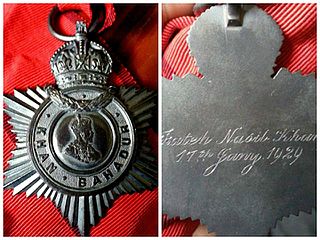 W
WKhan Bahadur – a compound of khan (leader) and bahadur (brave) – was a formal title of respect and honour, which was conferred exclusively on Muslim and other non-Hindu natives of British India. It was one degree higher than the title of Khan Sahib.
 W
WKhan Sahib is a compound of khan (leader) and sahib (master) - was a formal title of respect and honour, which was conferred mainly on Muslim, but also to Parsi, Irani, and Jewish subjects of the British Indian Empire. It was a title one degree lower than Khan Bahadur, but higher than that of Khan.
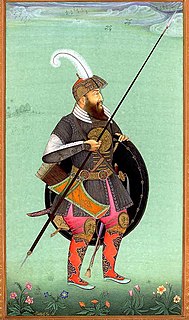 W
WMian or Miyan is a royal title of the Indian subcontinent, also sometimes used as a surname. Begum or Beygum, is used to describe the wife of a Mian. It is used by several monarchs of Indian states.
 W
WMirza is a royal and noble title. It is also used as a surname or prefix to identify patriarchal lineage.
 W
WMullah is an honorific title for Sunni Muslim clergy or a Muslim mosque leader. The term is also sometimes used for a person who has higher education in Islamic theology and sharia law.
 W
WMunshi is a Persian word, originally used for a contractor, writer, or secretary, and later used in the Mughal Empire and India for native language teachers, teachers of various subjects, especially administrative principles, religious texts, science, and philosophy and were also secretaries and translators employed by Europeans.
 W
WNawab, also spelt Nawaab, Navaab, Navab, Nowab, Nabob, Nawaabshah, Nawabshah or Nobab, is a Royal title indicating a sovereign ruler, often of a South Asian state, in many ways comparable to the western titles of King. The relationship of a Nawab to the Emperor of India has been compared to that of the Kings of Saxony to the German Emperor. In earlier times the title was ratified and bestowed by the reigning Mughal emperor to semi-autonomous Muslim rulers of subdivisions or princely states in the Indian subcontinent loyal to the Mughal Empire i.e. Nawabs of Bengal. The title is common among Muslim rulers of South Asia as an equivalent to the title Maharaja.
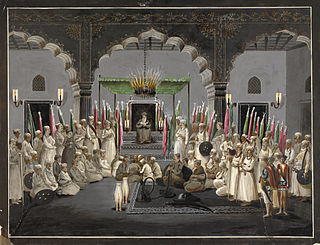 W
WSubahdar was one of the designations of a governor of a Subah (province) during the Mughal era of India who was alternately designated as Sahib-i-Subah or Nazim. The word, Subahdar is of Persian origin.
 W
WRai Sahib / Rao Saheb / Roy Sahib / Rao Sahib abbreviated R.S., was a title of honour issued during the era of British rule in India to individuals who performed faithful service or acts of public welfare to the nation. From 1911 the title was accompanied by a special Title Badge. Translated, Rai means "King" sahib means "leader".
 W
WRaja, is a royal title used for Indian monarchs. The title is equivalent to king or princely ruler in the Indian subcontinent and Southeast Asia.
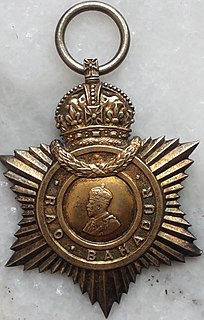 W
WRai Bahadur, abbreviated R.B., was a title of honour bestowed during British rule in India to individuals for faithful service or acts of public welfare to the Empire. From 1911, the title was accompanied by a medal called a Title Badge. Translated, Rao means "prince", and Bahadur means "brave" or "most honourable". Bestowed mainly on Hindus, the equivalent title for Muslim and Parsi subjects was Khan Bahadur. For Sikhs it was Sardar Bahadur.
 W
WSahib or Saheb is a word of Arabic origin meaning "companion". As a loanword, it has passed into several languages, including Persian, Kurdish, Turkish, Kazakh, Uzbek, Turkmen, Tajik, Crimean Tatar, Urdu, Hindi, Punjabi, Pashto, Bengali, Gujarati, Marathi, Rohingya and Somali. During mediaeval times, it was used as a term of address, either as an official title or an honorific. Now, in South and Central Asia, it's almost exclusively used to give respect to someone lower in social ladder or menial workers. For eg, people address drivers as driver saheb and so on. The honorific has largely been replaced with Sir. It is often shortened to saab.
 W
WShah was a title given to the emperors and kings of Iran. It was also adopted by the kings of Shirvan namely the Shirvanshahs, and Khwarazmshahs. It was also used by Persianate societies such as the rulers and offspring of the Ottoman Empire, the Kazakh Khanate, the Khanate of Bukhara, the Emirate of Bukhara, Mughal India, Bengal Sultanate, Gorkha, and the various dynasties of Afghanistan. In Iran, the title was continuously used. Rather than King in the European sense, each Iranian ruler regarded himself as the Shahanshah or Padishah of the Persian Empire.
 W
WShaikh, also rendered as Sheikh, Sheik, Shaik, Shaykh, Shaikh, Shekh, Cheikh, Šeih, Šejh, Şeyh and other variants, is a title given to many South Asian Muslim castes. It originally was a word or honorific term in the Arabic language that commonly designated a chief of a tribe, royal family member, Muslim religious scholar, or "Elder". However in South Asia it was used as a title by castes that rarely had any Arab descent.
 W
WSardar, also spelled as Sirdar, Sardaar, Shordar or Serdar, is a title of nobility that was originally used to denote princes, noblemen, and other aristocrats. It has also been used to denote a chief or leader of a tribe or group. It is used as a Persian synonym of the Arabic title Emir.
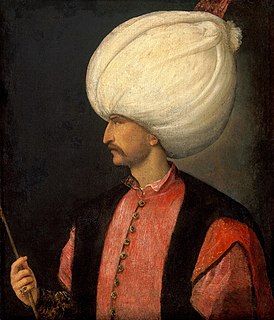 W
WSultan is a position with several historical meanings. Originally, it was an Arabic abstract noun meaning "strength", "authority", "rulership", derived from the verbal noun سلطة sulṭah, meaning "authority" or "power". Later, it came to be used as the title of certain rulers who claimed almost full sovereignty in practical terms, albeit without claiming the overall caliphate, or to refer to a powerful governor of a province within the caliphate. The adjective form of the word is "sultanic", and the dynasty and lands ruled by a sultan are referred to as a sultanate.
 W
WSultana or sultanah is a female royal title, and the feminine form of the word sultan. This term has been officially used for female monarchs in some Islamic states, and historically it was also used for sultan's consorts.
 W
WSayyid is an honorific title denoting people accepted as descendants of the Islamic prophet Muhammad and his cousin and son-in-law Ali through his grandsons, Hasan ibn Ali and Husayn ibn Ali, sons of Muhammad's daughter Fatimah and Ali.
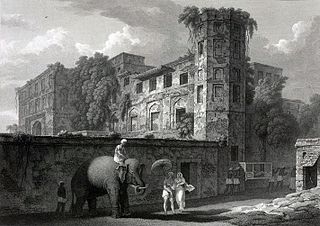 W
WThe Talukdars or Talukders, were aristocrats who formed the ruling class during the Delhi Sultanate, Bengal Sultanate,Mughal Empire and British times. They were owners of a vast amount of lands, consistently hereditary, and were responsible for collecting taxes. The Taluqdars played helpful roles in the progression of Indian architecture and Indian economy during the reign of Emperor Shah Jahan and Aurangzeb, particularly in Bengal Subah, the most economically developed province in South Asia.
 W
WA vizier, or wazir, is a high-ranking political advisor or minister in the near east. The Abbasid caliphs gave the title wazir to a minister formerly called katib (secretary), who was at first merely a helper but afterwards became the representative and successor of the dapir of the Sassanian kings.
 W
WWāli, Wā'lī or vali is an administrative title that was used in the Muslim World to designate governors of administrative divisions. It is still in use in some countries influenced by Arab or Muslim culture. The division that a Wāli governs is called Wilayah, or in the case of Ottoman Turkey, "Vilayet".
 W
WZamindar, Zomindar, Zomidar or Jomidar (Bengali:জমিদার) is a term for a landowner. It was introduced during the British colonial rule. Typically hereditary, zamindars held enormous tracts of land and control over their peasants, from whom they reserved the right to collect tax on behalf of imperial courts or for military purposes.